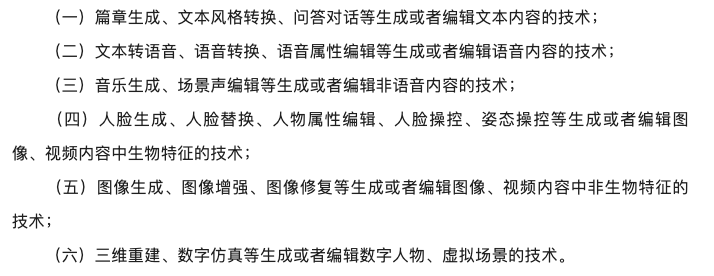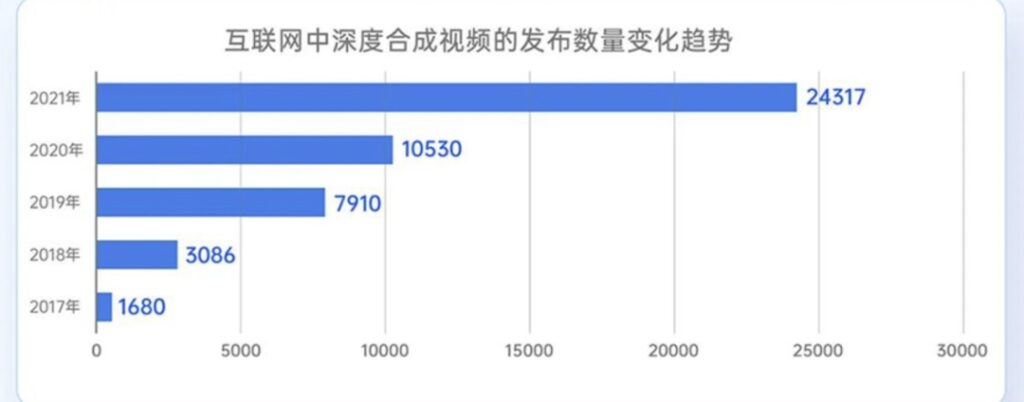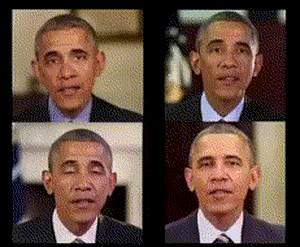Command Palette
Search for a command to run...
The Shoe Has Dropped: ChatGPT's Domestic Development May Be "put on the Brakes"

Contents at a glance:While deep synthesis services meet user needs and improve user experience, they are also used by some unscrupulous persons to produce, copy, publish, and disseminate illegal information, slander and defame the reputation and honor of others, impersonate others to commit fraud and other illegal acts. Now, management regulations for this technology have finally been released.
Keywords:Deepfake deep synthesis regulation
Recently, the Cyberspace Administration of China issued the "Regulations on Deep Integration Management of Internet Information Services", stating that the regulations have been reviewed and approved by the Cyberspace Administration of China, and approved by the Ministry of Industry and Information Technology and the Ministry of Public Security, and will come into effect on January 10, 2023.

The shoe has landed, and deep synthesis technology has been used to fill in the gaps
In fact, as early as January this year, the Cyberspace Administration of China issued the "Regulations on the Management of Deep Integration of Internet Information Services (Draft for Comments)" and publicly solicited public opinions. After 11 months, the draft has finally come into effect.ChatGPT, which has been making great strides recently, may have its development in the country put on hold.
The management regulations officially released this time further clarify the scope and usage specifications of deep synthesis technology.Covers relevant technologies in multiple modalities such as text, image, audio, video, etc.

The appendix gives a clear definition of "deep synthesis technology"
In addition to general provisions, the management regulations also provide more detailed specifications and explanations for data and technical management standards, supervision and inspection, and legal responsibilities. This article will list some of the key provisions.
Prohibition of producing and spreading false news
Providers and users of deep synthesis services shall not use deep synthesis services to produce, copy, publish or disseminate false news information. Those who reprint news information produced and published based on deep synthesis services shall reprint news information published by the source unit of Internet news information in accordance with the law.
Using deep synthesis technology requires real-name authentication
Providers of deep synthesis services shall authenticate the real identity information of users of deep synthesis services in accordance with the law based on mobile phone numbers, identity document numbers, unified social credit codes or national online identity authentication public services.Information publishing services shall not be provided to deep synthesis service users who have not authenticated their real identity information.
Involving multiple pieces of personal information, separate consent is required
Deep synthesis service providers and technical supporters should strengthen training data management and take necessary measures to ensure the security of training data; if the training data contains personal information, they should comply with relevant regulations on personal information protection.
Deep synthesis service providers and technical supporters who provide face, voice and other biometric information editing functions,Users of deep synthesis services should be prompted to inform the individuals being edited in accordance with the law and obtain their separate consent.
Content generated or edited using deep synthesis services must be prominently marked
For information content generated or edited using the Deep Synthesis service,It is stipulated that technical measures should be taken to add logos that do not affect user use.And keep log information in accordance with laws, administrative regulations and relevant national regulations.
The deep synthesis service provider provides the following deep synthesis services, which may cause confusion or misunderstanding among the public:The information generated or edited should be clearly marked in a reasonable location or area.To alert the public to deep synthesis:
(1) Intelligent conversation, intelligent writing, or other services that simulate a natural person to generate or edit text;
(2) Editing services that generate voices such as synthesized human voices or imitation voices, or that significantly change personal identity characteristics;
(3) Editing services that generate images or videos of people, such as face generation, face replacement, face manipulation, posture manipulation, or that significantly change personal identity features;
(IV) Generation or editing services of immersive simulated scenes;
(5) Other services that have the function of generating or significantly changing information content.
Where a deep synthesis service provider provides deep synthesis services other than those specified in the preceding paragraph,A prominent marking function should be provided, and users of deep synthesis services should be prompted that they can make prominent markings.
Improve the complaint and reporting portal, standardize the process and feedback time limit
Providers of deep synthesis services should set up convenient portals for user appeals and public complaints and reports, publish processing procedures and feedback time limits, and promptly accept, process and feedback processing results.
Complete the "Regulations on the Management of Deep Integration of Internet Information Services".
The road to deep synthesis technology governance is long and arduous
In recent years,The amount of deep synthetic content has exploded.The Institute of Artificial Intelligence of Tsinghua University has collaborated with several institutions to release the "Top Ten Trends in Deep Synthesis Report (2022)".
The report points out that the number of newly released deep synthesis videos in 2021 is higher than that in 2017.The growth rate has exceeded 10 times.It involves many fields including film, television, music, science and technology education, life, entertainment, information, etc.

The amount of deep synthesis content is huge and difficult to identify.There have been many attempts at home and abroad to establish and improve supervision and management mechanisms.
November 2019The Cyberspace Administration of China, the Ministry of Culture and Tourism, and the National Radio and Television Administration jointly issued the "Regulations on the Management of Online Audio and Video Information Services", which clearly stipulates that "new technologies and applications based on deep learning, virtual reality, etc. shall not be used to produce, publish, or disseminate false news information."
December 2019The Cyberspace Administration of China has passed and promulgated the "Regulations on the Ecological Governance of Network Information Content", prohibiting the use of deep learning and virtual reality technologies to engage in any illegal activities.
December 2020The Central Committee of the Communist Party of China issued the "Implementation Outline for the Construction of a Rule of Law Society (2020-2025)", which requires the formulation and improvement of standardized management methods for new technologies such as deep fakes.
also,The United States and the European Union have also issued a number of relevant laws and regulations regarding deep synthesis technology.
December 2019The U.S. House of Representatives passed the "Fiscal Year 2020 National Defense Authorization Act", requiring the government to report to the legislature on Deepfake disinformation activities involving transnational, organized, and political purposes.
The European Union has publicly asked technology giants to take measures to intensify the fight against Deepfakes, otherwise they will be fined huge amounts, up to 6% of their global turnover.
From the ZAO APP that was forced to be removed from the shelves within less than a week of its launch, to the real and fake Obama, to Ants,Deep synthesis technology is constantly evolving, and policies and regulations need to keep pace with the times.

Only by promoting the legal, reasonable and effective use of deep synthesis technology,Only by actively preventing and resolving the risks brought by deep synthesis technology can we promote the healthy development of Internet information services and maintain a good ecology of cyberspace.








